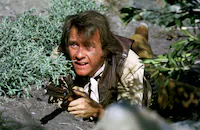Un flic
Brief Synopsis
Cast & Crew
Jean-pierre Melville
Alain Delon
Richard Crenna
Catherine Deneuve
Riccardo Cucciolla
Michael Conrad
Film Details
Technical Specs
Synopsis
Bank robbery in small town ends with one of the robbers being wounded. The loot from the robbery is just a asset for the even more spectacular heist. Simon, gang leader and Paris night club owner, must also deal with police comissaire Edouard Colemane, who happens to be his good friend.
Director

Jean-pierre Melville
Videos
Movie Clip




Trailer
Film Details
Technical Specs
Articles
Un Flic
Melville was a one-man filmmaking combine who famously lived in an apartment above his own studio; both Bertrand Tavernier and Volker Schlondorff schooled here, and the Cahiers du cinema crowd loved him. No wonder - Melville's overcast, moody images of lost men in fedoras facing the inevitable uselessness of their lives on Earth come off as iconic as traditional Christian sculpture, and his fascinating habit of revisiting places and instances from successive points of view makes him a filmmaker-philosopher, the undisputed Antonioni of the genre film.
Un Flic (1972), Melville's last film, opens with a signature Melvillian set-piece - a robbery of a seaside bank during a foggy rainstorm, perpetrated by a car full of black-hatted stone faces in a nearly wordless cascade of planned action and unplanned accident (the dialogue is in glances). The lengthy sequence exudes enough existential mood and noir weight for five movies; here we are reminded, after wincing at the glib triumphalism of contemporary heist films, that crimes are almost always acts of desperation and doom. Of course one of the thieves is wounded, thereby tipping the dominoes that will eventually lead very busy detective Alain Delon to the bank robbers. But in Melville nothing happens simply, and no police investigation unrolls in purely procedural fashion. Like crazy movie heisters, the crooks immediately start plotting another robbery, this time to abscond with a suitcase of heroin carried on a train by a thug that, not so coincidentally, Delon is planning to intercept and arrest. The connective tissue between the bad guys and Delon's threadbare detective squad is varied and half-hidden - except for the femme semi-fatale presence of Catherine Deneuve as the woman being shared, even if her romantic alliance with a lawman doesn't stop her from posing as a nurse to murder the wounded fourth bank robber in his hospital bed.
To paraphrase William Hurt from The Big Chill (1983), men in hats are always doing something terrible. Un Flic (A Cop in French slang) is in some ways Melville's most American film - the climactic heist is a preposterous train-boarding-via-helicopter stunt that seems to have outpaced Melville's budget (it's executed with fairly adorable toy miniatures), and several of the key roles - the most cold-blooded of the thieves - are played by non-headlining Hollywood character-actor stalwarts Richard Crenna and Michael Conrad. The film also, in its stoic French way, verges on self-parody, as when Crenna's mastermind rappels down from the helicopter in the middle of the night onto the moving train, sneaks inside and doffs his laborer's coveralls for... a red hound's-tooth silk robe! (He has to pass in the corridor for an overnight train passenger, of course.)
Melville's default strategy is to withhold information; significant actions and dramas are always unfolding off-screen and in between scenes. Typically, Un Flic is rich with secrets - Delon and Crenna (who owns a nightclub) seem to know each other well, outside of their mutual interest in Deneuve, but at one pivotal point the three of them sit down and share a drink and say nothing. Somewhere, secrets are divulged, of course, but not to us. Melville's hidden equations and doublings and postponed judgments were famously influential on Quentin Tarantino's screenwriting style, and it instills all of the master's films with a sense of fatalistic menace, as Melville's repressed, hopeless men in trench coats go about their machinations in a world where they understand only part of what is going on, and know for certain only that things will not fall their way. Un Flic was Melville's thirteenth and final feature - he died a year later, of a heart attack at age 55, and with him went the European neo-noir's sense of authentic despair. Noir itself had become a pose and a bank of clichéd images by the '70s anyhow; only Melville still believed in the genre's capacity for truth and resonance. Since then, every effort at noir is retrospective, nostalgic and self-regarding. Melville was the last man standing, and Un Flic is both his and the genre's swansong.
By Michael Atkinson

Un Flic
Quotes
Trivia
The opening shot closely resembles Hokusai's famous woodcut "The Wave".
Miscellaneous Notes
Released in United States 1972
Released in United States 1972
Re-released in United States June 28, 2013
Re-released in United States June 28, 2013

















